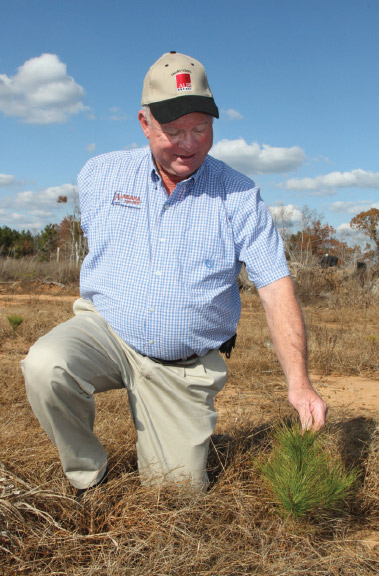Auburn Researchers Turn Timber Into Fuel

Just as trees are planted with the future in mind, the Department of Biosystems Engineering and Center for Bioenergy and Bioproducts at Auburn University are refining technology that could fuel Alabama’s timber industry for generations to come.
A team of graduate assistants, along with associate professor Sushil Adhikari and department head Steve Taylor, are working with other Auburn professors on a way to mass-produce diesel fuel and gasoline from trees.
“The technology to do this has been around almost 100 years,” Taylor said. “During World War II, the Germans used it to take coal and make fuel. Later, the South Africans figured out how to make gas from coal on a much larger scale.”
In a process called gasification, after timber is ground into wood chips, the chips are heated in a gasifier. The resulting gas then passes through a catalyst, usually iron or cobalt, where the molecules are restructured to form hydrocarbons, which then move to a distiller where anything from wax to jet fuel can be extracted.
Adhikari said even if the desired goal is diesel fuel, the process of synthesizing new molecules creates a range of products. While it may produce 50 percent diesel fuel, the other 50 percent could include a mixture of methane, ethane, propane, butane, wax and jet fuel.
“We still have a few big hurdles to jump,” Adhikari said. “You can make money when you have a big plant, but now we want to make a smaller plant. There are technological barriers we need to overcome first.”
Logistics also are major factors in the economic feasibility of alternative fuels, Taylor said.
“If you have a plant like the South Africans do, you’d have to haul wood chips long distances to feed that plant,” Taylor said. “That makes your feedstock costs high. We’ve been trying to figure out how we can decrease trucking and harvesting costs, but then on the conversion end, how we can make it better or scale it down to make it more feasible.”
Dallas County Farmers Federation board member and 2009 Farm of Distinction winner David Wright owns about 1,500 acres of timber and said new market opportunities for timber owners would be welcomed. The housing bubble collapse, Conservation Reserve Program (CRP) hardwood tree planting and landowners opting for faster-growing loblolly pines created a perfect storm in his neck of the woods that led to a stagnant timber market.
“There’s an oversupply right now in this part of the country,” Wright said. “If you go south of here, it may be a different story because it’s more competitive in the pulpwood and saw timber business. In this area, you don’t have the competition to create good prices.”
Wright said pellet factories and biomass plants haven’t driven up costs for his timber.
“Eventually you’re going to find the end of fossil fuels,” he said. “You have to make it attractive all the way from the consumer, to the producer of the fuel, to the producer of the raw materials.”
Taylor said since the university’s initial investment, his department has secured grants totaling about $35 million and partnered with global energy companies to create one of the top biomass research facilities.
More work needs to be done, Taylor said, adding that one day he hopes biomass technology will not only power America, but fuel local economies throughout Alabama.
“If we can find a way to scale things down economically, it makes it more attractive to go to places like Selma, Brewton or Monroeville,” he said. “We can make diesel fuel from the pine trees out there. Most people think about ethanol and using corn to make ethanol. We’re way beyond that. We’re making something you can pour into your car today; you will never know the difference, but it came from pine trees in your backyard.”
